Confined Khaleda announces nonstop BLOCKADE
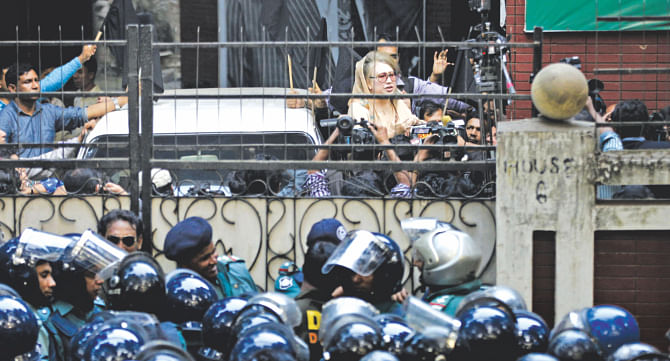
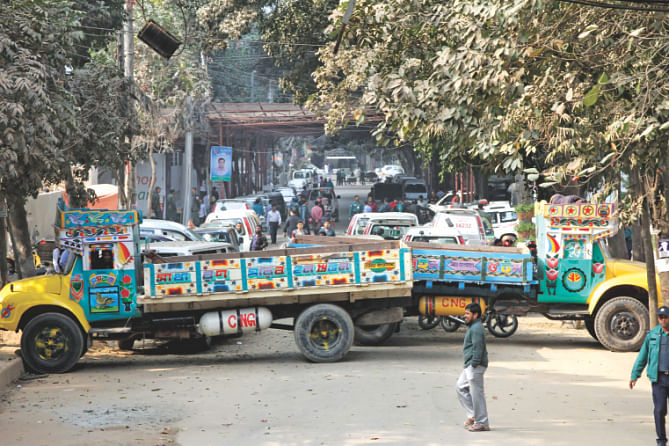
BNP chief Khaleda Zia yesterday called a countrywide blockade for an indefinite period from today to protest the government's not allowing her party and allies to hold rallies in the capital and elsewhere.
Having been confined to her Gulshan office since Saturday midnight, Khaleda made several efforts to come out yesterday afternoon, but law enforcers locked the main gate from outside and stood guard in several layers.
Cops also used pepper spray to disperse the party leaders and activists waiting inside the gate. Several BNP leaders and journalists were injured in the police action.
BNP leaders said Khaleda wanted to go to the party's central office at Nayapaltan, where leaders and activists were asked to gather for holding a rally to denounce the January 5 one-sided parliamentary election. The opposition party, which boycotted the polls last year, dubs the day as the “Democracy Killing Day”.
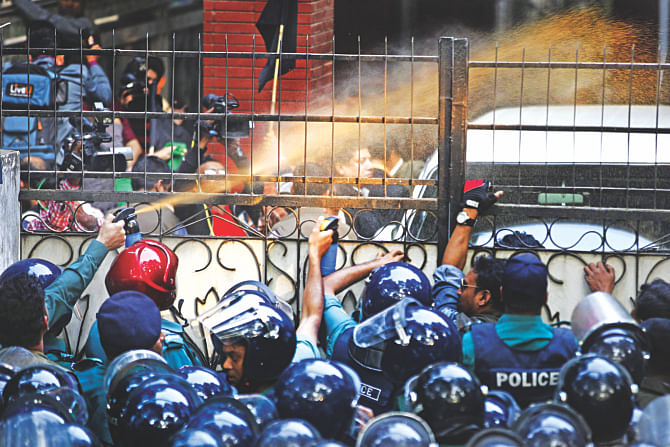
After the police action, the former prime minister announced the blockade of roads, railways and waterways across the country.
The blockade was called also to protest the BNP chairperson's confinement in her Gulshan office for the last two days and to demand a fresh general election under a nonparty administration.
"The blockade will continue until our demand is met," said a seemingly annoyed Khaleda, while talking to journalists at her office.
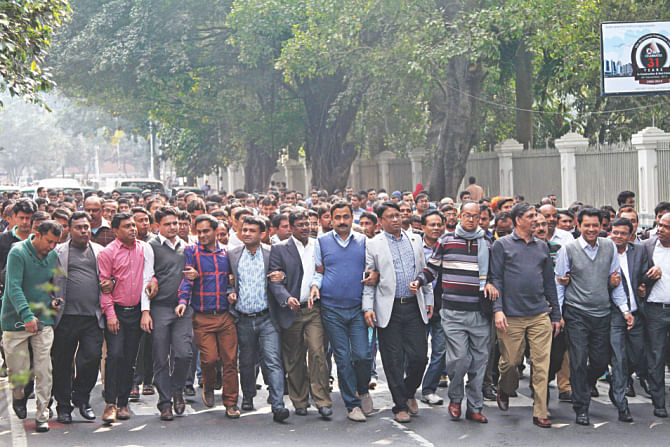
Ambulances, press vans, vehicles of fire brigade and utility services, and restaurants, hotels and drug stores will remain out of the purview of the blockade, party sources said.
Meanwhile, the ruling Awami League and its various front organisations defied an indefinite police ban on political activities in the capital. They brought out processions and held rallies and human chains in many parts of the city to celebrate the day as the "Victory Day for Democracy”.
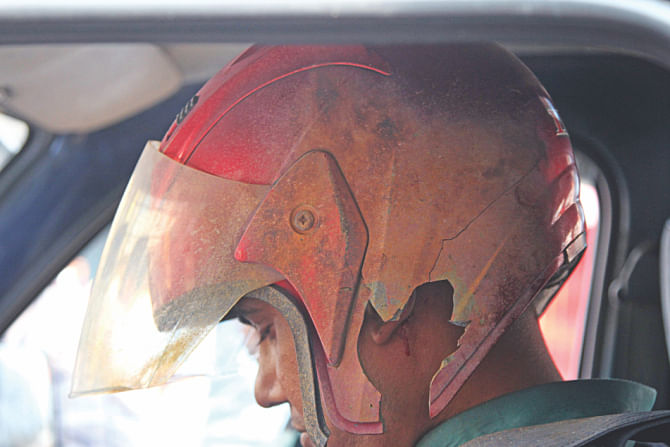
But the government took every measure to thwart the BNP's bid to hold any rally in the capital.
On the way to the BNP chairperson's office, 12 trucks, some of them loaded with sand and bricks, were placed at Sunday midnight. Three police trucks, three armoured personnel carriers and a water cannon were also positioned on nearby streets to "beef up'' security.
In a similar fashion, Khaleda was confined to her Gulshan residence on December 29, 2013. She was not allowed to join the “March for Democracy” aimed at resisting the January 5 polls.
On Saturday night, cops picked up BNP Joint Secretary General Rizvi Ahmed from the party's Nayapaltan office and forcibly admitted him to a hospital. The law enforcers also drove out all other leaders and activists of the opposition party and its office staff and locked the main entrance from outside.
All roads to Khaleda's Gulshan office and the party's Nayapaltan office were blocked and guarded by a large number of law enforcers, preventing the BNP men from gathering there.
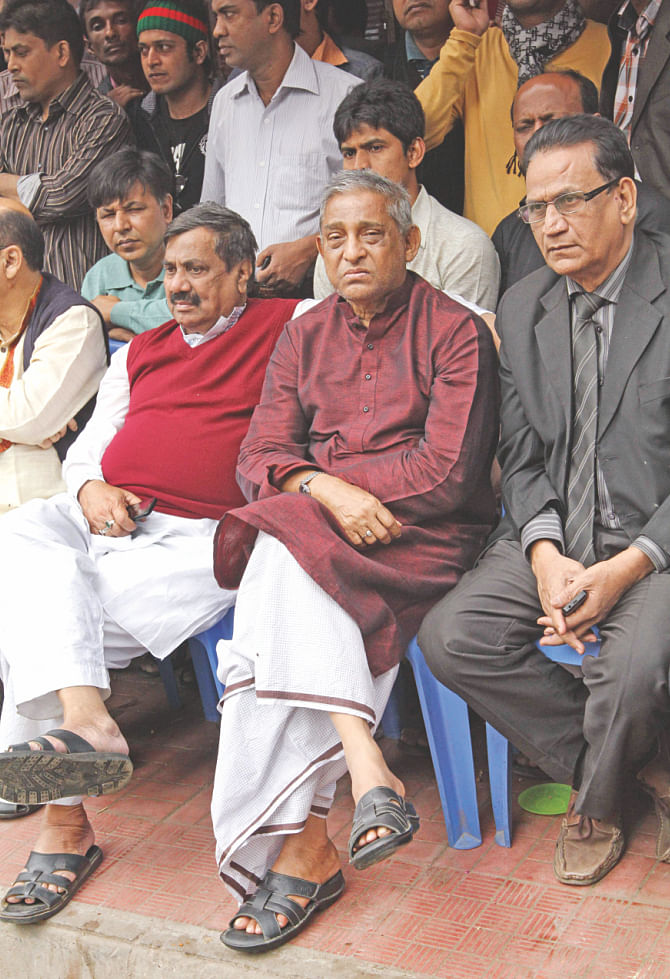
The government action to foil the BNP's planned rally also caused immense public sufferings in the capital and elsewhere. The government used the administration to cut off the capital from the rest of the country since Sunday, by snapping major roads and waterways communication. Inter-district communications were also disrupted.
Outside the capital, BNP men brought out processions in several districts and clashed with AL men and police. Four people were killed in such clashes.
But the city streets were under the control of the ruling party activists, who took to the streets in their hundreds to observe the first anniversary of the January 5 polls.
Police, instead of enforcing the ban, helped the ruling party men to stage showdowns in different areas and gather in front of unit offices and important city points. Thus aided, the AL men sat on chairs in the middle of various roads and had fun. Riding on bikes and pickups, they drove through different areas for hours to “prevent violence” by opposition men.
The Daily Star reporters saw almost identical pictures in Mirpur 10, Pallabi, Gabtoli, Mohammadpur, Hazaribagh, Lalbagh, Sayadabad, Jatrabari, Motijheel, Shyampur, Shanirakhra, Dhupkhola, Kataban, Khilgaon and Farmgate areas.
In some areas, they arranged musical programmes where artists sang and danced, attracting passers-by and police alike.
Besides, patriotic songs and the March 7 historic speech of Bangabandhu Sheikh Mujibur Rahman were also played.
Sticks-wielding ruling party men were seen guarding at least three places on the Beribandh road stretching between Gabtoli and Kamrangirchar.
They stopped vehicles, particularly CNG-run auto-rickshaws, and interrogated passengers about their destinations and where they are coming from.
They were also seen threatening drivers not to ply vehicles.
Hundreds of Awami Swechchhasebak League men took position in front of Matsya Bhaban with banners to greet Prime Minister and AL chief Sheikh Hasina on her way to and from the secretariat.
They also staged a showdown in the area.
Khairul Islam Jewel, an organising secretary of Swechchhasebak League, said they did not hold any procession or rally to respect the police ban on political activities.
“We just remained alert in the streets as conscious citizens of the country to safeguard democracy,” he said.
But another leader of the organisation said they were asked to gather there by the party high-ups.
“We had no option but to come, though I know it violates the law,” said the leader, seeking anonymity.
Several hundred Chhatra League men staged motorcycle showdowns in Shahbagh and Press Club areas.
Party central and city unit leaders took position before the party headquarters on Bangabandhu Avenue.
City AL General Secretary Mofazzal Hossain Chowdhury Maya, also disaster management minister, and Qamrul Islam, food minister, were present there.
Asked if their gathering defied the DMP ban, Maya said the AL was not holding rallies and processions. "We have taken to the streets so that no one can create anarchy.”
Around 10:30am, Maya went to the Jatiya Press Club where around 100 activists of Bangladesh Muktijoddha Projonmo League took position since morning.
The picture was quite the opposite near the BNP office.
From early morning, law enforcers cordoned off its headquarters and put up barricades on all the roads leading to it. Several hundred members of different law enforcement agencies took position at different points around the office.
Police set up barbed-wire fences at the Kakrail intersection, one of the entry points to the BNP office. Similar fences were at Fakirapool intersection.
No one was allowed to cross the barricades expect for the journalists, who had to show their identity cards. But there was no restriction to enter the AL office area.

 For all latest news, follow The Daily Star's Google News channel.
For all latest news, follow The Daily Star's Google News channel. 


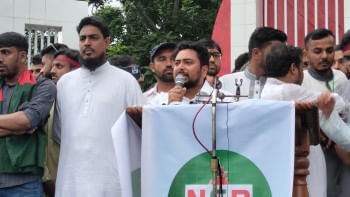
Comments